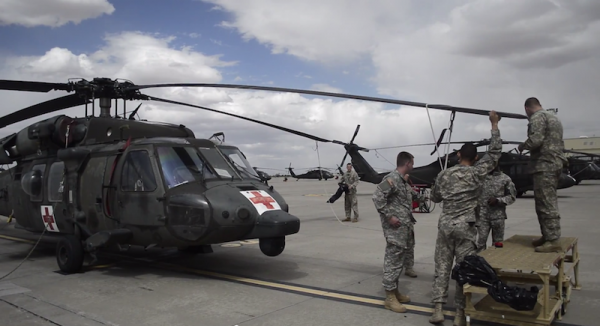EL PASO — A year after the Ebola epidemic ravaged West Africa the risk of resurgence lingers, but communities continue to make progress toward rebuilding due to brave international humanitarian efforts, including those of soldiers from El Paso.
Months after the Ebola outbreak began killing thousands of people in Liberia, more than 250 soldiers from here shuttled the sick by helicopter from isolated villages to Nairobi for treatment at facilities they helped build.
The soldiers, primarily from the 501st Aviation Regiment deployed last October from Fort Bliss to participate in “Operation United Assistance” in Liberia.
“It was not a combat mission,” said Chief Warrant Officer Landon Dykes. “This was a different scenario, a different role for the entire task-force and our entire purpose was to help the people of Liberia combat Ebola.”
According to the Center for Disease Control and Prevention, by the beginning of October there were more than 3,600 confirmed cases of Ebola in Liberia, and a total of 1998 deaths as well.
Worry turns into hope
Although at first the news of that mission generated some concern among the troops and their families, it quickly shifted to optimism once the task force touched ground in Africa.
“Once we got there the reality was that we were all very happy to be a part of it,” Dykes said. “It was an honor to see how thankful the people of Liberia were as a nation.”
Soldiers described the experience as different than what they expected leading up to the mission.
“It was actually not bad,” said Sgt. Cody Chambers. “The people there were really nice, really generous and they were never threatening in any way.”
Although the presence of the task-force alone was a sign of hope for the people of Liberia, the extreme working and country conditions represented a challenge for the operation.
Transportation challenges
Liberia lacks road or highway infrastructure, making transportation of goods and people nearly impossible by land, according to Dykes.
“It could take up to two-weeks to travel from one side of the country to the other,” he said.
In total, more than 1,700 flight hours were logged by the Task Force Iron Knights transporting supplies, engineers, medical personnel and equipment to construct Ebola treatment units.The operation concluded in February 2015.
Monitoring health conditions
The World Health Organization declared on May 9, 2015 that the Ebola outbreak in Liberia was over after 42 days passed without any new cases being reported. The country remained vigilant and on June 29 reported that the body of a teenage boy tested positive for the virus. The country could again be declared Ebola free by the WHO on Aug. 28 after another 42 days have elapsed with no new cases being reported.
While in Liberia, U.S. troops were constantly monitored, took anti-malaria medication twice a day and had their temperatures checked at least twice a day to catch early symptoms of malaria or Ebola.
“We were almost at no risk for Ebola,” Chambers said. “The people we interacted with everyday they were all checked. … Anytime we interacted with people we were checked ourselves.”
All the troops that participated on the mission entered 21-day controlled monitoring areas on Fort Bliss and joint base Lewis-McChord upon their return from Africa. By March they were all out of monitoring.

Combat Aviation Brigade training at Fort Bliss. Photo by Alonso Moreno, Borderzine.com
The Combat Aviation Brigade
The “Iron Eagles” Combat Aviation Brigade of the 1st Armored Division is based at Fort Bliss, and comprises about 2,600 soldiers. They describe themselves as a versatile, “multi-functional unit that fields military helicopters.”
The soldiers said they did their best to live up to the motto behind the Combat Aviation Brigade, one of the outfits that provided units for Operation United Assistance:
“Be combat ready, worldwide deployable, disciplined, and ready for any mission. We are ‘always ready’ for the next fight.”
